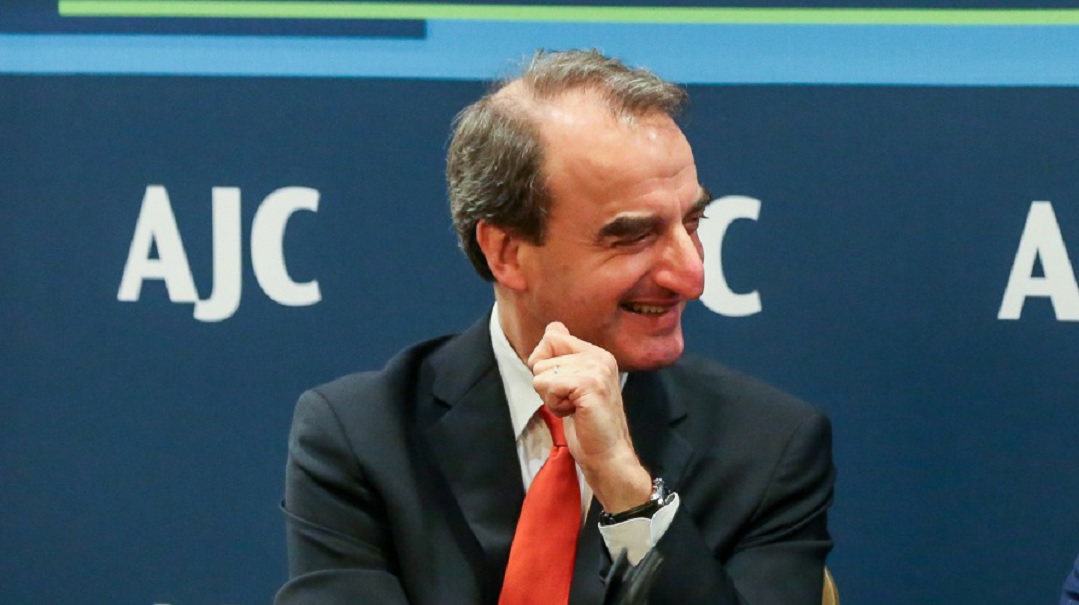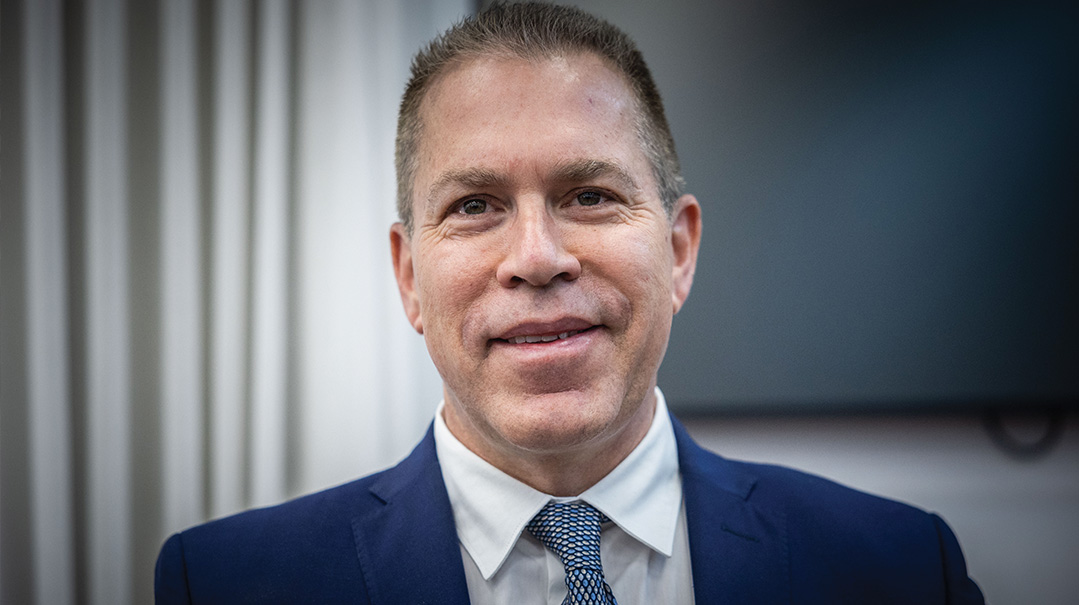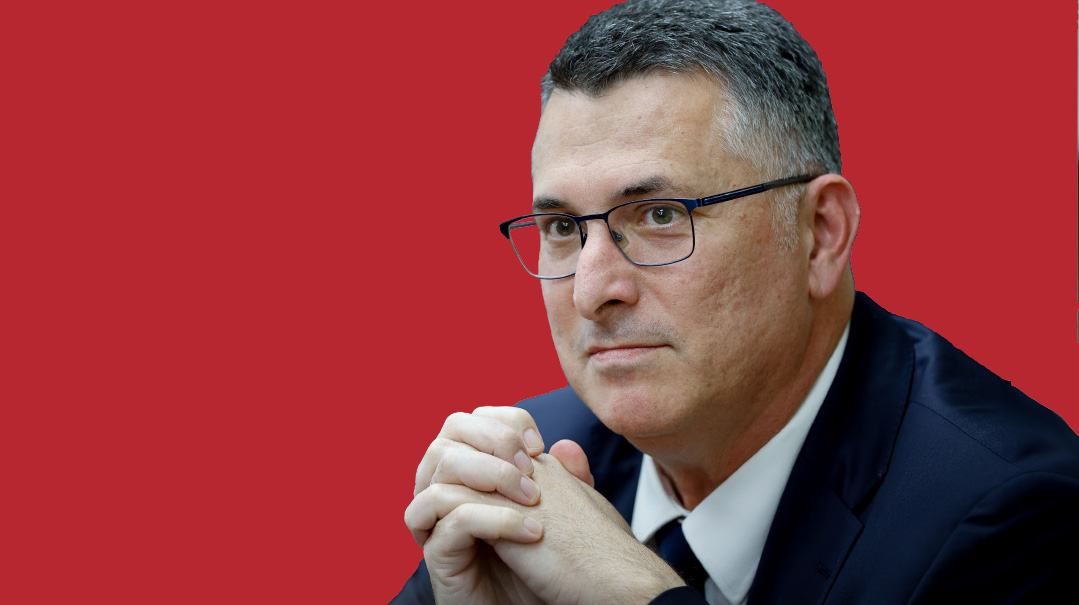A Few Minutes with AJC Chief Policy Officer Jason Isaacson

Since 1993, he has coordinated periodic AJC ministerial meetings throughout the Middle East, North Africa, Europe, and Asia

As the curtain falls on the Trump presidency, a cascade of normalization deals have been reached in the span of less than six months between Israel and Muslim states from the UAE to Sudan and Morocco.
Along the way, there has been much “track II diplomacy” — back-channel efforts by unofficial actors to advance the cause of Israel-Arab peace. One of those working in that capacity has been Jason Isaacson, chief policy and political affairs officer at the American Jewish Committee (AJC). He began as an observer to the 1991-92 Middle East peace talks in Madrid, Moscow, and Washington. Since 1993, he has coordinated periodic AJC ministerial meetings throughout the Middle East, North Africa, Europe, and Asia, often spearheading visits that were the first by an American Jewish civic organization.
Isaacson’s engagement with the North Africa region led, in July 2009, to King Mohammed VI bestowing on him the honor of Chevalier of the Order of the Throne of the Kingdom of Morocco — a connection that gives him a valuable perspective on the changes unfolding today.
Have you seen a change in the Middle East mindset since you started traveling there in the 1990s that might have contributed to the recent breakthroughs?
What I do recall traveling in the 90s after the Oslo Accords is seeing pretty much every day on the front page of newspapers in the Gulf stories, headlines and reporting on the latest atrocities as they saw it by Israeli soldiers and police brutalizing Palestinians. This was a daily fare in these countries. And even if one could talk to political figures, government officials, or people in think tanks and not hear the same obsession with the Israeli-Palestinian conflict, the daily diet of the public was full of propaganda against Israel. That has changed dramatically. It's now rare to find such stories as opposed to that everyday occurrence.
There are several factors for that. I think that leaders in many Arab countries are getting impatient and frustrated with the Palestinian leadership: openly, at least in private conversations, contemptuous of Palestinian leadership's corruption and political fecklessness; feeling that this leadership is holding back not only the Palestinians' own legitimate aspirations for political enfranchisement, for justice, but holding back the region -- and they resent it.
And part of it, I think, is the growing accessibility of information provided by the Internet, provided by cable news, by satellite channels in which it became harder and harder over the years for repressive governments to hide the truth of what was happening in Israel. The advances that Israel is making with few natural resources but tremendous ingenuity and encouragement of talent and education. It was possible to make the region prosper. And it was attractive and non-threatening. And Israel was open and stretching out its hands.
I think there's also a recognition of how far behind many parts of the Arab world slipped over the years, looking at the UN's development reports; that was really humiliating for many in leadership. And that, combined with, in recent years, American pressure, has really contributed to altered thinking.
This was certainly the message that I and my AJC colleagues were consistently sending to the leaders across the region, the people in think tanks and the media: that you're not helping the Palestinians by pretending Israel wasn't there. And you're holding back your own progress by not engaging Israel. And you can do both at the same time. You can help the Palestinian cause. And you can help your own populations by engaging Israel.
How did the 1991 Madrid peace conference change perceptions?
I remember hanging out in Madrid with a group of Arab journalists and feeling sympathy and commonality in a way that had not been my experience in the past. I did not have Arab friends growing up, I grew up in Long Island. But meeting people from Arab countries, seeing that we had a similar set of aspirations and expectations and fears, opened my eyes. And then in succeeding years, going back to these countries and visiting some of these people and seeing that we're not so different. We want the same thing for our families. And if you could break through the prejudices and propaganda, you could see your way to a different future -- and Israel will have to be part of that future.
Over the years, Israel had had secret contacts with Arab states. Why do you think they decided to take a chance and make it public?
That enters into other factors, such as the awareness of the continuing threat of Iran and extremism generally, but Iran specifically, and the obvious advantage of engaging Israel as an ally in a more open way and in a more comprehensive way. Part of it was clearly a very strong push by the Trump administration to encourage this breakthrough, and then providing incentives in a very transactional way that is not abnormal in international affairs.
At a certain point, you get tired of hiding and tired of waiting and you question the reasons why you're being so shy about something that is so obviously in your interest. It must be said that the region has been moving in this direction for years. But clearly the Trump administration's Vision for Peace, allowing Israeli annexation of a significant portion of the West Bank, provided a handle to the UAE to grab onto and say, 'OK, we want to move forward, but this has to be taken off the table.'
What are the implications for the Palestinians? Are they simply not relevant anymore? How could the Abraham Accords come to fruition without resolution of this conflict?
I think that there is still popular support across the Arab world for an independent Palestinian state, for an end to the unsatisfactory status of the Palestinian people.
The pursuit of the two-state solution, the pursuit of rights and fair treatment for the Palestinians, is not irrelevant, but it must be pursued in a much more pragmatic and intelligent way than it has been for so many decades, which, until now, has led to very little.
Saudi Arabia is a key regional player. What is your take on the Saudis’ internal debate over normalizing ties with Israel? Is it a difference of approach between the old guard and the new guard?
Yes, there are differences of opinion within the Saudi leadership, generational and in other ways as well.
There is recognition in Saudi Arabia that the old ways of propagating extremist versions of Islam, which can lead to violence in the name of the sacred texts, is no longer acceptable. It is no longer in the interest of Saudi Arabia and it is no longer in the interest of Islam. This reassessment has been going forward at the same time that Saudi Arabia under MBS is opening up to the world -- seeking to engage investors and other partners to enhance the image and reality of Saudi Arabia as a modern state. But it is being done slowly and carefully. It is occurring alongside changes within Islam in Saudi Arabia.
We know that Joe Biden wants to rejoin the Iran deal. Can he return to this deal now, when there is a united front of Israel and Arab countries opposing it?
There are a lot of reasons why the president-elect should move very slowly on returning to a diplomatic initiative with the Iranians. One reason is the consensus among American allies in the region opposed to the deal and opposed to giving up the leverage that has been provided by the maximum pressure campaign. But if there is going to be a diplomatic effort, the aim should be a new package that meets not only the concerns about Iran's nuclear program, but also its international aggression, its support for terror, and its missile program -- with a negotiating strategy arrived at in consultation with those countries most directly affected by Iranian aggression, most directly threatened by Iran, and that means the Gulf states, and that means Israel. Middle East allies have to be part of the discussion.
(Originally featured in Mishpacha, Issue 841)
Oops! We could not locate your form.












